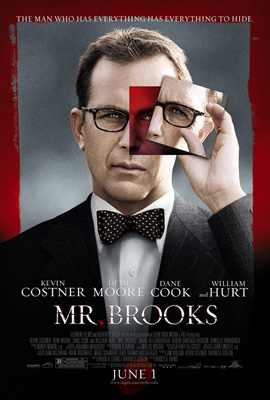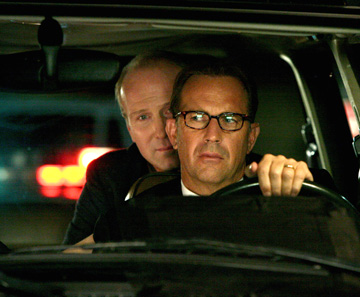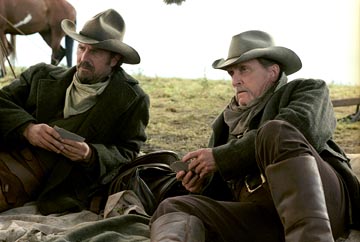 "We’re like a percentage of something going bad somewhere. It’s terrible."
"We’re like a percentage of something going bad somewhere. It’s terrible."
Though it’s not necessarily surprising to hear someone reflecting negatively on the sorry psychological state of the nation, this cynical tone can’t help but sound awfully dissonant when it’s coming from Kevin Costner, who is inseparable in person from his amiable onscreen persona. Whether he’s playing a boy scout (Elliot Ness in The Untouchables), a rake (Crash Davis in Bull Durham) or a bit of both (the iconic title role in the underrated Wyatt Earp), you’re always on his side. Heck, you even fall in love with him as a murderous convict in Clint Eastwood’s beautiful A Perfect World.
Perhaps in reaction to his three-decade streak as one of the most likeable movie stars going, Costner’s taken on another serial killer in Bruce A. Evans’s Mr. Brooks, and this time he’s playing him… well, he’s pretty damn likeable in this one, too. What’s different, however, is the tone; in an interesting move for a commercial film, Evans, who co-wrote the script with Raynold Gideon, establishes from the beginning that beneath Mr. Brooks’s compassionate façade lies a murderer. There’s no warming up period in this movie. Costner’s knocked right out of his comfort zone, and he responds with what might be the most impressively nuanced performance of his career.
It’s about time Costner dirtied up his image a little. The "Aw, shucks" vibe is always welcome, but we might appreciate it more if it went away every now and then. If the above quote is any indication, it sounds like Costner might be ready to indulge his dark side more frequently. He’s definitely unnerved.
That is, unnerved for Costner. For most of the below roundtable interview, he’s confident, laid back and seemingly genuine while discussing his creative process, Dane Cook (whose comedy he does not get) and his upcoming western.
Q: Why did you decide to do something so dark?
Costner: The decision was pretty simple. I thought the writing was the star of the movie. And while I didn’t see myself like that person, I thought, "I could do this." Even though you have to professionally cover movies, I’m sure deep down you love movies and probably love movies when they surprise you. On paper, I thought this movie had all of those moments if we embraced them and went for them. I understood that it would be seen as a departure. I understood all of the things that would come with it, but I still felt like, "If I’m going to make a life of making movies, then I should try to make different movies." And this seemed to fit in a positive way.
Q: Did it ever occur to you to direct Mr. Brooks?
Costner: I thought about that, but when I realized what the pedigree of the project was, and that the writers who wrote it wanted to direct it, we had a discussion about that. I could’ve done that, but in this instance it was important for [Bruce] to direct. I’ve worked with a lot of first-time directors and writer-directors, and I thought, "I’ll give this a chance".
Q: Did you always know you were going to produce?
Costner: I knew that. I knew that without a doubt I would have [to produce]. I also knew that I would have to have final cut on it because the… odd things about [the movie] I knew would be the things that would be cut first. If you don’t like blood, blood would be gone. If you don’t like "this", "this" would be gone. They ask audiences, "What do you like?" "I don’t like this." But I thought that this piece was dark. It’s insidious, even though we find ourselves laughing at some moments – the oddity of it. I felt that it needed to be true to itself. And if no one else wanted to make this movie and I wanted to make it, why would I let anybody try to flatten in out and make it more generic? So while I know some longtime [fans] who’ve enjoyed my movies might be offended by this, might think it’s too harsh… I get that, and I accept that. But I don’t want to cater to my audience; I just want to feed it. Take it or not take it. It’s an honest effort.
Q: Were you familiar with Dane Cook’s standup material before he was cast?
Costner: I wasn’t familiar with his standup, and I’m actually glad because I don’t completely understand his standup. (Laughter) But I understand him, and I understand his desire to not be pigeonholed or be conformed. He read for me. He read for this movie. He did all the things that someone who has a bigger idea about their career does. That’s why he got the part. And he was sensational in it.
Q: Do you think there’s a little bit of Mr. Brooks in yourself?
Costner: The things that we all see in Mr. Brooks [that we see in ourselves] are that we would all go defend our daughter, that we would go kill for them. Mr. Brooks isn’t looking for forgiveness. "Don’t you see that I’m a nice guy?" No, he’s not. He has a disease. When that disease isn’t working, he is a nice guy. But the families that he’s dismantled, both the ones that have died and the boat wake that comes after, that kind of thing where families are destroyed forever… we don’t really deal with that. That’s why we can’t ever forgive him. But where Mr. Brooks is successful, I think, is that it creates a certain kind of empathy. And empathy always comes in our life when we have a level of understanding. You may not like the serial killer, may never forgive him, he destroyed your girlfriend’s life forever. You might know him, and know that he was assaulted and abused since he was three-years-old. You can’t forgive him then either, and you can’t say anything to her, but in your heart you go, "That poor fucker never had a chance". You have empathy because you have a level of understanding of him. In movies, we can create a level of understanding if we choose to invest in the character, and that’s what made Mr. Brooks stand out to me as a serial killer movie. Because I don’t like serial killer movies; I don’t like scary movies. I get scared. I don’t like roller coasters and shit like that. I don’t like being scared. It’s not an adrenaline rush for me. So Mr. Brooks really had to pass a lot of things for me to even want to be a part of it. And it did.
Q: Were you scared when you watched it?
Costner: No.
Q: When you read it?
Costner: C’mon, man! (Laughter)
Q: Well, not really scared. But did it take you aback the first time you read it?
Costner: No. I was in the safety of my own little couch, and I knew no one was going to get me. Look, I like writers. And I like protecting writing. I like seeing writing find its way to the screen, so if I was going to be scared at all about Mr. Brooks, I would’ve been scared that someone else had final cut.
 Q: Were you afraid the character of [Mr. Brooks’s imaginary alter-ego] Marshall would overwhelm the movie?
Q: Were you afraid the character of [Mr. Brooks’s imaginary alter-ego] Marshall would overwhelm the movie?
Costner: I knew it was a really flashy role, and I very often take movies that have scene-stealing roles all around me. And I relish that. I think it’s important for movies, and I don’t get scared by that stuff. I encourage the actors to be really good around me. I want that to happen, and I want them to do it inside the lines of the movie. So when I see a great role, I want to go after a great actor. A great actor recognizes a great role. It raises the level of the whole movie. [Marshall] is a pleasing role, and sometime the temptation in American movies now, the conventional wisdom is that they’ll ask you what scenes you hated the most. Then they’ll ask you what scenes you liked the most. In modern day filmmaking, that scene that you hated the most will go flying out of the movie, but that doesn’t mean it should’ve. It gives the movie a balance. They might ask you about characters, and you’ll say, "Well, I really like Marshall the most." Then the executives go, "Let’s write some more scenes for Marshall!" I think Marshall is in there just perfectly. Just perfectly.
Q: How was it playing opposite William Hurt [who co-stars as Marshall].
Costner: It was fun. I’ve known William because of The Big Chill. We’re both rehearsal oriented actors, and writer-driven actors. It fit into our game really nicely.
Q: Is Marshall based on a person from Mr. Brooks’s past?
Costner: Yes. [As Mr. Brooks] I found Marshall when I was twelve-years-old in a book of children’s dreams, and he would play the black knight, an evil person. But I liked him in the book because he was kind of cool. I liked him so much that I was afraid he was going to die in the book, so I never finished it. And my father used to discipline me with the idea that, if I wasn’t good, the black knight would come and get me, that he actually hid in my closet. And like any young man, I eventually challenged my dad’s theory and opened that closet, and there was my imaginary friend. And he was not scary at all to me. So he’s been with me [ever since] as my alter-ego.
Q: Bruce Evans had directed only one film [Kuffs] prior to Mr. Brooks. What did he do to convince you that he could accomplish this visually?
Costner: (Smiling) Well, I didn’t look at his other movie. I didn’t want to because, once I committed to him as a director, I wanted to try to support him, and I didn’t want to get panicked. I mean, I’d heard different things, but I didn’t want to jade that. Once I gave him my word that he would get a chance to direct it, I wanted to back that up. But I also wanted to protect the movie with final cut.
Q: What do you look for when you’re reading scripts?
Costner: Just fresh air. Just something that seems highly original. I would never do this movie it was pitched to me. But I would never have done Field of Dreams if it was pitched to me. It takes a writer that really has his muse working on his shoulder, and you go, "Wow, this is an incredible window they’ve found into this subject." For instance, I thought Thirteen Days was great. The window into that story was Kenny O’Donnell, not Jack’s point of view or Bobby’s point of view. It’s hard to write. It’s an art form.
Q: When you write, where do you look for inspiration?
Costner: It just comes to me. I don’t consider myself a great writer, but I feel like I recognize a great idea, and I feel like I protect great writing. I think that’s my talent.
 Q: In that sense, do you think great writing isn’t respected in Hollywood?
Q: In that sense, do you think great writing isn’t respected in Hollywood?
Costner: I don’t think it is. The minute you’re willing to ask an audience what they think about the movie, then nobody cares about the writing; you care what [the audience] thinks. But unlike conventional wisdom, I don’t go out and make a movie when the script is sixty-percent just because I got the actor and the director and I think the job’s done. I’m anal. I don’t go out to actors until my script is 100% done because I don’t want anybody changing it. Annette Bening and Robert Duvall didn’t change a line on Open Range. Why? Because I was sure that it worked. William Hurt, Dane Cook and I… we didn’t change any lines in our half of the movie because I was positive it worked. Yeah, there’s blood. There’s a lot of blood. That’s what this movie was about. But there’s a lot of tenderness, too. (Pauses)
What is everybody so afraid of? Not being number one at the box office? Well, we ain’t going to be. We’re not even going to be close. But we can be a movie that’s so true to itself that you might want to take a friend back to it. Or you might never want to see it again because of what it is. But it might speak so loudly to somebody, [they’ll say to a friend] "I want you to see this movie." And I’m proud that those elements are in there that would drive you back to it. I think it has classicness.
Q: Can you say anything about the western you’re working on now, and will you be using the same editor from Open Range?
Costner: I’ll probably use the same guy. It’s just a good cowboy movie. It’s about friendship. There’s a code. It’s written; it’s 100-percent done. I’m not sure… people aren’t dying to make [westerns]. I’ll just have to figure out how to make it. I’ll have to mortgage something else. (Laughs)
Q: Do you think there’s a killer gene as posited in this movie?
Costner: I don’t really know. You hear about alcoholism being passed on, and genes and stuff like that. I think we’re a generation that’s just learning about what gets passed on. Our eyes are opening every day as to what… I mean, just about the time we think a protein diet is the right one, somebody goes, "So wrong!" Every diet, somebody’s like "Wrong!" four years later. There’s too many of us in the city. There’s too many of us… look, it’s weird out there. We’re all like some number. One out of somebody gets assaulted, and women have it worse. It’s like, "What the fuck?" We’re like a percentage of something going bad somewhere. It’s terrible.
Q: Are you surprised that Brian De Palma is going back to make an Untouchables prequel, and do you have any thoughts on Nicolas Cage playing Al Capone or who should play Malone?
Costner: (Grinning) No. I don’t think about it at all. I think about it now because you brought it up.
Q: It was a seminal film for you.
Costner: It was a very important film to me, and it was very important to Brian. I’m not surprised that they’ve circled back to it to squeeze some more out of it. (Mimes the ringing of a wet rag)
Mr. Brooks opens nationwide on June 1st.